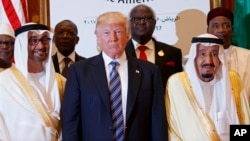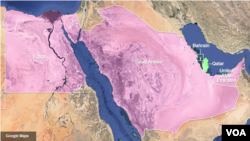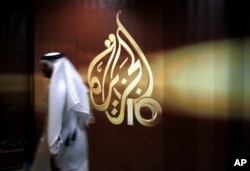The White House says President Donald Trump and Saudi King Salman bin Abdulaziz Al Saud spoke by telephone, and the two stressed the need for Gulf unity following a decision by Arab states in the region to cut ties with Qatar.
A statement issued late Tuesday said the two discussed the "critical goals of preventing the financing of terrorist organizations and eliminating the promotion of extremism by any nation in the region."
Earlier in the day, the president entered the diplomatic spat involving Qatar and major Arab nations over Doha’s alleged support of Iran and Islamist militant groups sponsoring terrorism in the region.
In a series of three Twitter posts Tuesday, the president seemed to take credit for the Saudi-led move to isolate Qatar — which hosts the largest U.S. military base in the Middle East.
Referring to his speech in Riyadh last month in which he called on Muslim leaders to take a stand against radical Islamist groups, Trump tweeted:
He followed that with two tweets that formed one message:
"I can't help you with that," Defense Department spokesman Captain Jeff Davis told reporters Tuesday in response to a question about how to reconcile the Trump tweets with the Pentagon's supportive comments about ally Qatar.
"We recognize that there are differing views in the region that have gotten us to this point," U.S. Marine Corps Major Adrian J.T. Rankine-Galloway told VOA. "We encourage all our partners in the region to reduce tensions and work towards common solutions that enable regional security."
White House press secretary Sean Spicer noted the long-simmering regional tension "is not new."
The United States wants a de-escalation and "continues to be in close communication with all parties to resolve the issues and restore cooperation, which is so important in regional security," Spicer told reporters at Tuesday's daily briefing.
Ambassadors recalled
Saudi Arabia, Egypt, the United Arab Emirates and Bahrain have recalled their ambassadors from Qatar and closed all borders, citing Doha's relations with Iran and its alleged support for groups such as the Muslim Brotherhood, Hamas and al-Qaida.
Jordan on Tuesday downgraded its diplomatic relations with Qatar and revoked the license of Doha-based broadcaster Al Jazeera, which supports Qatari foreign policy.
Qatar described the economic blockade as a "violation of its sovereignty," asserting the crisis was based on "absolute fabrications."
Last month, reports on the state-run Qatar News Agency website quoted Qatari leader Emir Sheikh Tamim bin Hamad Al-Thani as questioning U.S. hostility toward Iran and claiming "tensions" between Qatar and the United States.Qatar said at the time it had been the victim of a "shameful cybercrime."
CNN reported Tuesday that U.S. investigators believe Russian hackers were responsible for planting a fake news story on the website that contributed to the crisis among the United States' closest Gulf allies. The U.S.-based cable news network quoted U.S. and Qatari officials as saying a team ofinvestigators had recently been sent to investigate the alleged hacking incident.
"Qatar has supported opposing sides of regional conflicts, and meddled in the internal affairs of its neighbors, including Saudi Arabia," Arabia Foundation executive director Ali Shihabi told VOA.
Shihabi, a Saudi national, added that Qatar's neighbors thought Doha "has carried out destabilizing efforts in each of their nations."
The combination of diplomatic and economic sanctions by so many of its neighbors hit hard in the peninsular emirate of 2.4 million people, which imports all its food.
The regional flare-up came after Trump denounced Shi'ite Iran's "destabilizing interventions" during his May 21 speech to Sunni leaders in Riyadh. He called for a united front against Islamic State and extremism, which led to hopes for an "Arab NATO."
After the president's tweets, U.S. lawmakers noted the complexities of the crisis.
Qatar has "been definitely playing footsie with a lot of terrorist organizations, but we have a big air base there," said Republican Lindsey Graham of South Carolina, a member of the Senate Armed Services Committee.
'Just shocking'
Considering there are thousands of U.S. military personnel in Qatar, "it is just shocking that the president would be tweeting out foreign policy statements without talking to his national security advisers about the potential effects on our troops," said Democrat Chris Murphy of Connecticut, a member of the Senate Foreign Relations Committee.
"None of our allies in the Middle East are perfect, but Qatar has been trying to bridge the gap between the Saudis and the Iranians," Murphy added.
A key question, according to Washington Institute for Near East Policy executive director Robert Satloff, is whether the United States brokers a deal leaving a chastened and repentant Qatari ruler still in power or lets Riyadh arrange a wholly new, totally compliant leadership.
Cairo-based analyst H.A. Hellyer, a nonresident fellow at the Atlantic Council, said wealthy Qatar has been punching above its weight through a series of wise investments, including Al Jazeera.
"The Qataris know that they don't have the power cards in this game," Hellyer said. "If relations between Saudi Arabia and Qatar are ruined, it is Qatar that stands to suffer tremendously in the short term, as it relies on Saudi Arabia for a land corridor and air space."
Kuwait, one of the Gulf countries not involved in the dispute, is trying to mediate a settlement. Kuwait's emir, Sheikh Sabah Al-Ahmad Al-Jaber Al-Sabah, flew to Riyadh for talks, which his court describes as a "brotherly visit."
VOA Pentagon correspondent Carla Babb contributed to this report.














